We love connecting with people who are passionate about fitness! No one ever asks about getting certified as a personal trainer without some kind of meaningful experience leading them to consider making fitness their career.
What’s amazing is how many different types of experiences lead people to make that leap. If you’ve ever thought you might love to be a trainer but worried that you weren’t a pro athlete or that you don’t have a science degree you’re actually in great company! Personal Trainers work with clients of all levels who have so many different types of fitness goals. Finding a trainer they can relate to is a super important part of their journey to success!
So without further ado – meet Tanya!
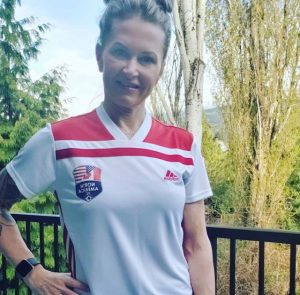
“My name is Tanya Lesstrange, I am a recent Graduate of the BCPTI Personal Training Progam and I am really excited to being my new career helping people realize their goals. I am 47 married with two daughters and I have Young Onset Parkinson’s Disease.”
What kinds of physical symptoms did you notice that prompted you to go to the doctor?
For years I had chronic injuries all on the left side of my body. I assumed that they were the result of a hamstring injury going unresolved. But as things got worse, symptoms of Parkinson’s began to emerge. One of the first serious symptoms was frozen shoulder, along with what I thought was plantar fasciitis, sciatic pain and then in 2012, I developed internal tremors and a very slight tremor in my right hand. It was at this point I finally saw my GP who referred me to a Neurologist and in 2013 I was (mis)diagnosed with Essential Tremor because, as the Neurologist put it I was “too young for Parkinson’s disease.” Well someone forgot to mention that to Parkinson’s disease!
As the disease progressed, more symptoms began to emerge. I was having difficulty tying my shoes, doing up buttons, putting my hair up. My printing became smaller and difficult to read (Micrographia), the tremors became more noticeable, spread to my feet and they were a resting tremor. I couldn’t balance on my bike anymore and even fell a few times. Essential Tremor is a tremor with movement.I started to notice that I felt less “sharp” cognitively and I began to have trouble even walking. I thought I was destined to be in a wheelchair within a few years.
Then there was the fatigue. Fatigue was for me the most insidious of the symptoms. It came on like a freight train and demolished my ability to function. I slept for 10 hours a night, would work then come home and have to have a nap sometimes 2 just to get through the evening. I knew that this was not essential tremor so I went back to my GP and asked for a second opinion and on June 8, 2015, I got one. Within 10 minutes of looking at me, the new Neurologist told me I had Young Onset Parkinson’s disease. I was 42.
Parkinson’s Disease is a chronic progressive neurological disease chiefly diagnosed in men over 60 and is linked to decreased dopamine production in the substantia nigra and is marked especially by a tremor of resting muscles, rigidity, slowness of movement, impaired balance, and a shuffling gait. But there are over 40 symptoms that include depression, anxiety, apathy, pain, vision impairment, dystonia, medication-induced dyskinesias I am in the 10% of diagnosed with onset before 40. Currently, there is no cure and there are no medications that have disease-modifying effects. There is only symptom management. And as the disease progresses the medications are no longer effective in managing symptoms. The next step is Deep Brain Stimulation Surgery, which is the implantation of a pacemaker-like device with electrodes that are placed deep within the brain.
But there is one thing that may slow the progress. EXERCISE!
What did they tell you about how physical activity would change for you as a result of your diagnosis?
The very first thing the Dr. said to me after telling me I had Young Onset Parkinson’s disease and writing me a prescription, is that he wanted me to start exercising, yesterday! I asked him how much exercise and he said this “exercise more often than you would like to, and harder than you think you are capable of.” And that was the beginning of my journey with fitness.
I started by registering for a Mud Mulisha race and the TC 10k in 2016. I also signed up at a local gym and started working out 3 days a week. This was an extremely difficult time for me. I was so exhausted I would cry on my way to the gym, or have to lay down in my foyer while I waited for a friend to pick me up for a running group. My running times seemed to be getting slower and slower. I decided at that point to give up running and cycling a focus on weight training. And it was at that point that I started to notice a change. I adjusted my diet, and not only did the weight start to come off, but my energy levels improved. The medications became much more effective, my mood was better, I was feeling more confident and the best of all the symptoms of Parkinson’s became virtually non-existent. Things were good, I felt I had Parkinson’s figured out. And during this time my love and passion for fitness emerged.
“No Matter How We Feel, We Get Up, We Show Up, We NEVER Give Up!”
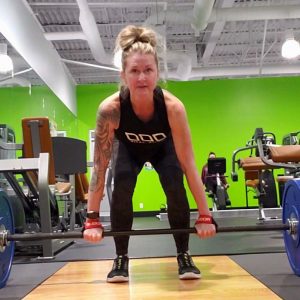
I started a Facebook support group for People with Parkinson’s who understand the importance of physical fitness. It now has over 850 members from around the world. All types of physical activity are represented; running, cycling, boxing, swimming, kung fu, ballet, table tennis, pickleball, weight training, CrossFit, golf, hiking, etc. In Parkinson’s Road Fitness Fun we encourage those who want to start exercising to start. We motivate each other when we find ourselves lagging. We set goals, we share tips and ideas, people post photos and videos and celebrate each and every accomplishment as a victory. Our motto is “No Matter How We Feel, We Get Up, We Show Up, We NEVER Give Up!” I am so proud of all of our members.
How were you involved in fitness or sport previously?
I played sports as a kid and kept active most of my adult life, skiing, walking, running and at times I would try the gym but I was always inconsistent. The years leading up to being diagnosed I was running and had recently started cycling to train for the Ride to Conquer Cancer which I did in 2013.
How did you come to decide to go to the gym and start working with Jakeb?
As soon as the Steve Nash Club opened in Nanaimo I knew I wanted to be a member there. The moment I walked in I was HOOKED! I also knew that after 4 years of working out on my own I wanted to take things to the next level. Parkinson’s is relentless and even though I am convinced I was impacting the progress of the disease, it was still progressing. I needed to step up my fitness game. I wanted to get even stronger but just didn’t know how to get myself there.
I had some issues as a result of the way that Parkinson’s was affecting my body. I had tremors on the right side, but my entire left side was a mess. Frozen shoulder left me with a scapula I couldn’t retract, glutes that would not properly engage, sciatica, etc. I needed someone that would understand the neurological deficits Parkinson’s caused and could help me work around them and that is when I met Jakeb. While he had never worked with someone with Parkinson’s before, he had worked with other clients with neurological issues so he understood what I was dealing with.
What was your experience working with him? What improvements did you notice?
Jakeb made me feel understood from the moment I met him and he was confident that he could help me reach my goals. He believed I could do it, so I did too. Confidence is contagious! I told him I wanted to get a strong as I could he recommended a powerlifting program; squats, deadlifts, pullups presses…all the things I thought I couldn’t do. Turns out with the right coach I could! I felt re-inspired about exercise! I felt more confident in the gym and outside the gym, my physique started to rapidly change, I got stronger. All those little nagging issues started to resolve. I still have shoulder mobility issues, and my left side still has a mind of its own but I move so much better. I am now about 8 years into the disease process and still many people have no idea I have Parkinson’s disease. I have never had a fall, I am very mobile even when my medications have worn off.

What motivated you to pursue becoming a trainer?
When I started the support group on Facebook I started sharing things I was learning in my pursuit of fitness. I made short videos demonstrating different exercises with explanations on how to do the exercise correctly or modify it if needed and also why I felt it was a good choice. My husband was the first person to tell me I should think about being a trainer as he felt I could really help people because I truly understood how exercise can change someone’s life. But I wasn’t sure how to become certified.
It was during my time training with Jakeb that I started to reconsider becoming a certified PT. I asked him all kinds of questions but used the excuse that I was ‘asking for a friend’. When I finally admitted I was interested he encouraged me to do it and recommended BCPTI!
What advice would you offer for anyone dealing with health issues potentially limiting their physical fitness?
For the most part, there is some type of exercise everyone can and should be doing. In my podcast (yup I have a podcast too, called The Parkinson’s Road Podcast) I did an episode on self-compassion and it is something I encourage everyone to implement in their own lives. Simply put self-compassion is both being gentle and kind with yourself and acknowledging you are struggling, you are not perfect and that is ok but at the same time, it is loving yourself enough to hold yourself accountable to step up the challenges life presents us with. You are stronger than you think! And if you need help hire a professional who can get you started. I am not talking strictly about personal trainers (although I am biased =) ) No matter what activity you choose there is most likely a professional who will help you begin your journey!
What advice would you give to trainers about working with someone who had health challenges?
Take some time to learn about their condition if it is something you are not familiar with. Not only is it your due diligence as a fitness professional but it will go a long way in gaining your client’s trust and loyalty. Parkinson’s disease is the second most common neurodegenerative disease after Alzheimer’s but so many people still have no idea what Parkinson’s disease actually is or how it affects those with it. I can’t tell you what a relief it is when I don’t have to explain what it is or how it affects me.
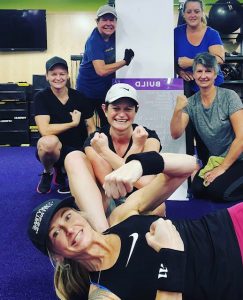
Give Tanya a follow on instagram @tanyalesstrange and take a look at our other fantastic student spotlights here!
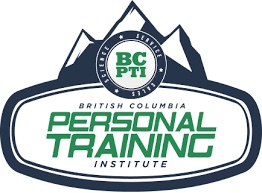

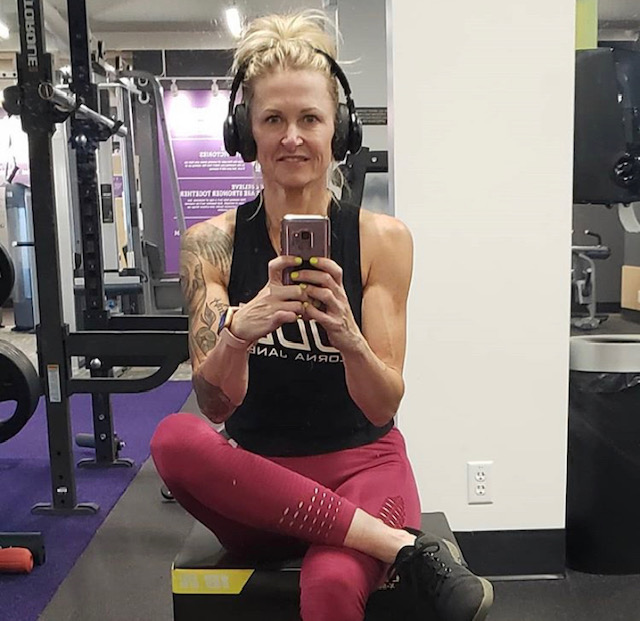




Hi Tanya, this is your cousin Mike Hoover in Oliver. It looks like we have something in common.
This is a great article I am going to read it again.
All The best
Mike
There is certainly a great deal to learn about this topic. I like all the points you have made. Merline Darby Kancler